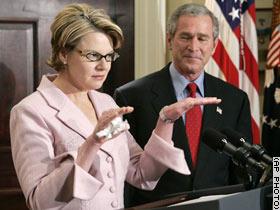By rights, I should be a Republican. No, I’m not kidding. Bear with me for a moment.
If the Republican Party actually carried through on the core principles it espouses, I’d pretty much have to register that way. I’m all for a decrease in government’s interference in the personal lives of its citizens, and that goes for silent intrusion as well as active meddling. I’m all for the government being as small as it needs to be, and no smaller. I believe that the government provides a number of critical services, and those should be funded, but that there should be intelligent restrictions on its growth. I also believe in fiscal responsibility, in eliminating deficits, and in returning any surplus to the taxpayers (once all debts are paid off and services are funded).
So what do we have instead? A party that proposes amending the Constitution to prohibit some kinds of marriage, that keeps increasing the size of the government, and that runs up massive debts while cutting off income. Their leaders and highest-profile supporters tend to be the most annoying brand of hypocrite: preaching morality and decency while not acting in accordance with those ideals, publicly or privately.
As for debates about national security and terrorism, the more often I hear right-wingers respond to questions and criticism with accusations America-hating, the more I start to think that they have no rational policy, and their lame rhetorical attacks are meant to obscure this weakness. It’s probably an unfair perception, but it’s hard to avoid.
Then, of course, we have the Democrats. They’ve traditionally been in favor of increasing spending in order to provide expanded social services, which in any sane fiscal environment requires an increase in taxes. Thus the old cliché of “tax-and-spend liberal”. (To which I usually reply, “Well, duh, if taxes are levied then the money should be spent”.) But the last Democratic president, faced with a surplus, used it to get government debt under control. He didn’t try to blow it all on entitlements, at least not after the universal health care proposal died, or try to fund some massive boondoggle. He actually used it to reduce the fiscal burden on future generations.
The usual argument is that he didn’t do this of his own volition, but was forced into it by a Republican Congress. I no longer accept that claim, because I’ve been watching the current Republican Congress. No real signs of fiscal discipline there, I’m sorry to say. So it would seem that the party of smaller government and fiscal responsibility is, in reality… the Democrats. Say what?
As for national security, the left has been great about asking tough questions, but not all that good at formulating a decent policy—or, if they have one, then they’ve done a terrible job of promoting it. It’s one thing to criticize what’s being done, and quite another to propose a workable alternative.
And that leads us up to the 2004 Presidential election. I’m reminded of the 1988 election, when I seriously considered flipping a coin to determine my vote. Neither choice really made me happy. Same thing here. I’m no fan of President Bush or his policies, but I’ve yet to see that Kerry is a worthwhile alternative. I know some people who say “Anyone but Bush,” but I categorically refuse to pick the leader of the country that way. I know some people claim nobody could be worse than Bush, and I’m glad they do, because it makes their reality-distortion tendencies more obvious. There’s plenty of people who could be worse than Bush. The question in my mind is whether or not John Kerry would make a better leader than George W. Bush.
It would be nice if I could get a clear picture along those lines. So far, any hope of finding out has been obscured by the fountains of venomous bile the two sides keep spewing at each other. Back in late 2000, I wrote:
…I’m finding that every time a campaign spokesman from either side opens his mouth, my opinion of him drops. Every time. That’s just, you know, depressing.
It’s no less true, or for that matter less depressing, at present. And pundits wonder why voter apathy runs so high. I honestly think it’s because most of us just don’t want to waste any more time listening to the shrill schoolyard taunts that pass for political debate.
It doesn’t help that most taunts are equally applicable to both sides, thus deepening the sense of futility. To take just one example, the Republicans keep painting John Kerry as a “flip-flopper”. How droll. He has been a senator long enough to have voted in myriad ways, it’s true. In some cases, it’s because one bill is worth supporting, and another is not, even though they’re ostensibly about the same thing. In others, it might be that he’d changed his mind. Most humans do, at some point.
Thing is, Bush is no less a flip-flopper. He’s been against trade barriers like steel tariffs, and then for them. He’s been against education reform, and for it. He’s been against nation-building, and for nation-building. He’s been against independent inquiries into the 9/11 attacks, and for them. He’s been against negotiating with the North Koreans over their nuclear program, and in favor of negotiating with them. Those are some pretty major changes of position. And I’m generally okay with that; a pragmatist must sometimes change stance to get things done, and any intelligent person will change their mind if new and compelling information comes to light. I will gladly accept a leader who changes his mind when it makes sense to do so, or even when they have become convinced of the need to do so. Still, doesn’t it seems rather hypocritical of Bush and Cheney to excoriate Kerry for changing positions when W and company have been doing the same thing in fairly big ways?
It’s hard to take either party seriously any more. I sometimes wonder if there will be a serious political party in my lifetime—either because one of the existing parties grows up, or due to a serious-minded third party actually gaining traction and becoming a force in national politics. Both seem about equally unlikely.
And so I face the prospect of forcing myself to the polls, participating in the election process only because abstention is unacceptable to me. Thus a right and a duty becomes a frustration and a chore.
That’s probably the worst part of all.







